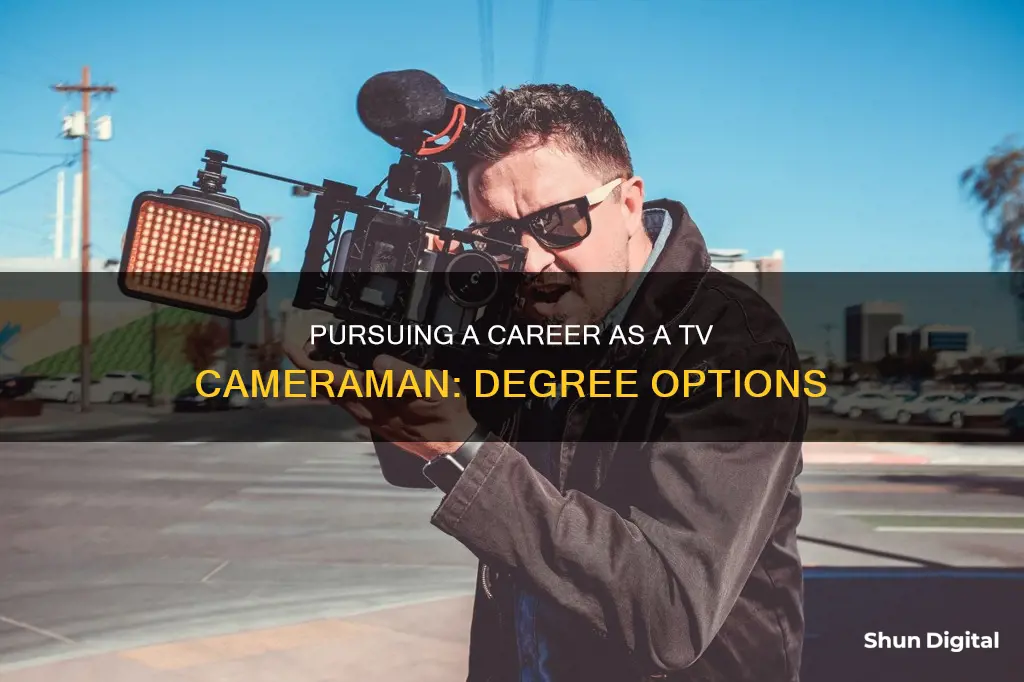
Aspiring TV cameramen should consider a bachelor's degree in film production, videography, media production, media technology, or photography to gain the skills and knowledge required for the role. While a degree is not mandatory, it can provide a competitive advantage and help develop a solid understanding of camera equipment and the underlying technology. Additionally, internships, apprenticeships, or entry-level positions can offer valuable on-the-job training and industry connections, which are crucial for career advancement.
| Characteristics | Values |
|---|---|
| Working hours | 10+ hour shooting days |
| Salary | $71,964 - $108,186 per year |
| Education | A bachelor's degree in film production, videography, photography, media production, or media technology |
| Experience | Camera assistant, production assistant, internships, or short courses |
| Skills | Working knowledge of cameras, lenses, and other equipment; artistic eye; stamina; flexibility; collaboration; time management; communication; critical thinking |
What You'll Learn
- University courses in media production, media technology or photography can help you develop camera skills
- A degree in film production or videography will ensure training in skills and equipment
- Camera operators need to know how to use equipment like dollies, rigs and cranes
- You can start as a camera assistant and learn on the job
- A cameraman must be able to work under pressure and have good collaboration skills

University courses in media production, media technology or photography can help you develop camera skills
University courses in media production, media technology, or photography can help aspiring TV cameramen develop the necessary camera skills. While a degree is not always necessary, it can provide a solid foundation of knowledge and skills required to succeed in the field. Here are some ways in which these university courses can help you develop camera skills:
Media Production Courses:
Media production courses often include modules that directly relate to camera work and can provide a strong foundation for aspiring TV cameramen. These courses typically cover a range of topics, including camera operation, lighting, sound, and other technical aspects of video production. Students can gain hands-on experience with different types of cameras and equipment, learning how to compose and capture high-quality video images. Additionally, media production courses often emphasize the practical aspects of the field, including production processes, storytelling techniques, and industry standards, providing students with a well-rounded skill set.
Media Technology Courses:
Media technology courses focus on the technical aspects of media production, including camera technology and other equipment used in the industry. These courses can provide an in-depth understanding of camera mechanics, sensor types, lenses, image stabilization, autofocus systems, and other camera features. By enrolling in such a course, aspiring TV cameramen can gain expertise in operating and maintaining camera equipment, ensuring they are well-prepared for the technical demands of the job. Media technology courses often include practical components, allowing students to apply their knowledge through hands-on projects and industry placements.
Photography Courses:
Photography courses can be an excellent choice for developing camera skills, as they focus on the art and technique of capturing images. While still photography differs from video camera operation, the fundamental skills and principles are transferable. Photography courses teach students about composition, lighting, exposure, and other technical aspects of image capture. They encourage students to develop their unique style and artistic eye, which can be valuable for TV cameramen who need to compose visually appealing shots. Additionally, photography courses often cover digital image processing and editing, providing skills that are relevant to post-production processes in the television industry.
Other Benefits of University Courses:
University courses in media production, media technology, or photography not only provide technical skills but also help students develop soft skills valued in the television industry. These include creativity, interpersonal skills, and communication skills, which are essential for collaborating effectively with directors, producers, and other crew members. Furthermore, these courses often include modules on industry practices, ethics, and networking, providing students with a comprehensive understanding of the television industry. Finally, university courses can offer opportunities for internships or work placements, allowing students to gain valuable practical experience and make industry connections that can enhance their career prospects.
Monitor Your Camera Violation: A Step-by-Step Guide
You may want to see also

A degree in film production or videography will ensure training in skills and equipment
A cameraman is responsible for operating camera equipment, setting up cameras and lighting, using different lenses and angles, and planning shots. They must have a working knowledge of cameras and lenses, as well as lighting and sound equipment. A degree in film production or videography will provide training in these areas, as well as teaching the technical skills needed to operate and maintain camera equipment.
In addition to technical skills, a TV cameraman also needs strong interpersonal and communication skills, as they often work as part of a team and need to be able to take direction from directors and other crew members. A degree in film production or videography will also help develop these skills, as students often work on group projects and collaborate with others in the course of their studies.
Furthermore, a degree in film production or videography can provide valuable industry connections and networking opportunities, which can be crucial for finding work as a TV cameraman. Internships and work placements offered as part of these degrees can also give students a foot in the door and help them gain valuable hands-on experience in the field.
Overall, a degree in film production or videography can provide a solid foundation for a career as a TV cameraman, offering training in both technical skills and industry knowledge, as well as valuable networking opportunities.
Watching Sports with HD DV SQ11 Mini DV Camera
You may want to see also

Camera operators need to know how to use equipment like dollies, rigs and cranes
To become a TV cameraman, you'll need a combination of technical skills, creativity, and a good understanding of the industry. While a degree is not strictly necessary, it can be helpful to have one in film production, videography, photography, or video production. This will give you a solid foundation in the skills and equipment you'll need on the job.
Camera operators need to know how to use equipment like dollies, rigs, and cranes to achieve the desired camera movements and angles. A dolly is a wheeled cart or similar device that allows for smooth horizontal camera movements, known as dolly shots or tracking shots. The camera is mounted on the dolly, and the operator and their assistant usually ride on it to push it back and forth. Dolly grips, or dedicated technicians, are trained to operate the dolly by manually pushing it back and forth. They can also perform compound moves, operating the dolly on perpendicular axes simultaneously.
Dolly shots are used to follow a subject in action, creating smooth and controlled footage of their movement. They can also be used to reveal a location, draw the viewer's attention, or produce psychological effects like a dizzy or surreal atmosphere. When used with other camera movements, dolly shots can highlight the theme or message of a scene.
Rigs and cranes are also used to achieve specific camera movements and angles. A camera crane is a lifting machine that enables cinematographers to shoot scenes from up above the action. It can accommodate the camera and operator or be operated by remote control. Rigs are not mentioned as often as dollies and cranes, but they are likely to be variations of the equipment mentioned above. For example, a rig could refer to the camera stabilisation equipment used in remote dolly systems.
Are NSA Agents Watching Us Through Our Cameras?
You may want to see also

You can start as a camera assistant and learn on the job
If you want to become a cameraman, one way to start is by becoming a camera assistant. This role will allow you to learn a lot on the job. You will get to know the equipment intimately: how it is packed and unpacked, how it works, what it does, and when to use it. You will also learn how to treat clients and talent, and how to communicate with the director and everyone else on set.
However, camera assistants are becoming less common as budgets drop, so it can be hard to find work as one. To improve your chances, look for high-budget work that you would like to be involved in, such as commercials or top-end documentaries, and research which production companies are using camera assistants. Then reach out to them to see if they would be willing to add you to their list.
Another option is to work for a rental company or facilities house. These companies rent out camera gear and sometimes supply cameramen or camera assistants with it. This way, you will get to learn about all kinds of camera gear, and if you impress the people who run the place, they might start sending you out with the cameras.
Working as a camera assistant or for a rental company is a great way to learn on the job, but it is also important to have a good understanding of the equipment and processes involved in filming. You can develop this knowledge by taking courses in photography and videography, or by studying for a degree in film production or videography.
Activating Your Apple Watch Camera: A Simple Guide
You may want to see also

A cameraman must be able to work under pressure and have good collaboration skills
A career as a cameraman can be demanding, requiring long hours, stamina, and the ability to work under pressure. It is a role that demands a lot of collaboration and teamwork, not only with other camera operators but also with directors, producers, and other crew members.
Being a cameraman often means working under pressure. Deadlines, last-minute changes, and the need to meet tight schedules are common in this line of work. For example, filming live events or news broadcasts, where there is only one chance to capture the action, can be stressful and require quick thinking and adaptability. Cameramen must be able to handle the pressure of working in such environments and make decisions on the spot.
Additionally, the physical demands of the job can be challenging. Cameramen often need to stand for long periods, carry heavy equipment, and work in uncomfortable or hazardous conditions. They may be required to work irregular hours, including nights, weekends, and holidays, and be on call to travel or respond to unexpected situations at any time. This unpredictable nature of the job can also impact their personal lives and planning.
Excellent collaboration and teamwork skills are essential for cameramen. They are part of a larger team, which includes directors, producers, and other crew members like lighting technicians and sound recordists. Effective communication and the ability to take direction are crucial, as they need to interpret the director's vision, collaborate on shot composition, and ensure their work aligns with the desired outcome.
Good collaboration also extends to building relationships with crew members and cast, which can lead to future opportunities. Working well with others can foster a positive work environment and contribute to the success of a project. It can also help cameramen advance their careers, as building a network of contacts and developing strong relationships with directors of photography are essential for career progression.
In summary, a cameraman must possess the skills to work effectively under pressure and collaborate productively with others. They need to be adaptable, handle stressful situations, meet tight deadlines, and work well within a team. These skills are essential for success in the demanding and collaborative environment of film and television production.
Tracking Hockey: TV Cameras and the Puck
You may want to see also
Frequently asked questions
A degree is not always necessary to become a TV cameraman, but it can be helpful. Relevant degrees include film production, videography, media production, media technology, and photography.
A degree can give you the basic knowledge required to succeed as a cameraman and help you build a network of contacts that can be vital when looking for entry-level jobs.
Degrees can be expensive and, when you enter the field, you will likely start with a low-wage entry-level position or even a volunteer position.
Yes, you can gain experience by working as a camera assistant, for a camera equipment hire company, or as a runner or camera assistant with a production company. You can also take short courses through the National Film and Television School or apply for the Guild of British Camera Technicians' Trainee Scheme.







